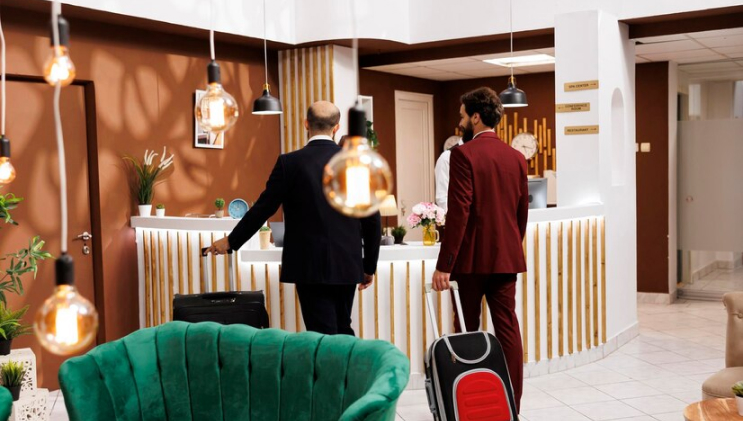
In the hospitality industry, the shift towards sustainability is more than just a trend; it’s a necessity. Running a sustainable small hotel contributes to environmental conservation and meets the growing demand from eco-conscious travelers. This guide provides a comprehensive overview of implementing sustainable practices in your small hotel, from energy efficiency to waste reduction and beyond.
A Step-by-Step Guide to Running a Sustainable Small Hotel

The shift towards sustainability is more than just a trend; it’s necessary. Running a sustainable small hotel contributes to environmental conservation and meets the growing demand from eco-conscious travelers. This guide provides a comprehensive overview of implementing sustainable practices in your small hotel, from energy efficiency to waste reduction and beyond.
What is Sustainability in Hospitality: Definition and Scope?

Sustainability, or the deliberate utilization of a resource so that it is not depleted or harmed, is critical in the hospitality sector. The success of hospitality businesses depends on preserving the natural and cultural features that draw travelers to their places. Negative outcomes can occur if not looked after properly.
With the appropriate leadership, hospitality firms can implement long-term business goals. Hospitalities with innate sustainable values foster efficiency and attract a permanent client base. These clientele primarily focus on socially responsible products and services. Pursuing an online leadership and management degree or certificate will help people lead their firms to success by emphasizing sustainability in hospitality.
Sustainable methods help hospitality organizations stand out. Today’s tourists, restaurant diners, hotel bookings, and retailers are concerned about sustainability. They want to know that their firms are ecologically, socially, and culturally responsible. Most millennials and Generation Zers are willing to pay extra for items and services that do not hurt the environment, deplete natural resources, or negatively impact the lives of people or wildlife.
Understanding Sustainability in Hospitality

Sustainability in the hospitality industry involves managing your hotel to minimize environmental impact while ensuring economic viability and social responsibility. It encompasses everything from reducing energy consumption and waste to supporting local communities and preserving natural habitats.
Step 1: Conduct an Energy Audit
The first step towards sustainability is understanding your current environmental impact. Conducting an energy audit allows you to identify areas where your hotel can reduce energy consumption. Look for opportunities to improve insulation, upgrade to energy-efficient lighting, and invest in energy-efficient appliances.
Step 2: Implement Water Conservation Measures
Water conservation is critical in running a sustainable hotel. Implementing low-flow faucets, showerheads, and toilets can significantly reduce water usage. Encourage guests to reuse towels and linens, decreasing water and energy consumption for laundry.
Step 3: Switch to Renewable Energy Sources
Transitioning to renewable energy sources such as solar or wind power can dramatically reduce your hotel’s carbon footprint. While the initial investment may be high, long-term savings and environmental benefits make it worthwhile.
Step 4: Embrace Waste Reduction Strategies
Waste reduction is a key aspect of sustainability. Implement recycling programs for paper, glass, plastics, and metals. Compost food waste and donate unused food to local shelters. Minimize single-use plastics by offering alternatives like glass water bottles and bamboo toothbrushes.
Step 5: Use Eco-Friendly Cleaning Products
Choosing cleaning products plays a significant role in your hotel’s environmental impact. Opt for eco-friendly cleaning agents that are biodegradable and free from harmful chemicals. These products are safer for both the environment and your staff.
Step 6: Foster Sustainable Food Practices
Source food locally and organically wherever possible, reducing carbon emissions associated with transportation and supporting local agriculture. Offer vegetarian and vegan options to cater to eco-conscious guests and reduce the environmental impact of meat production.
Step 7: Promote Sustainable Transportation
Encourage guests to use sustainable modes of transportation. Provide information on public transport, arrange for bike rentals, and install electric vehicle charging stations. Offering incentives for guests who choose eco-friendly transportation options can further enhance your sustainability efforts.
Incorporating Sustainable Amenities and Practices

A crucial aspect of running a sustainable hotel is choosing amenities that reflect your environmental commitment. One impactful choice is to use refillable body wash from Tirtyl Australia, known for its eco-friendly production methods and natural ingredients. This reduces plastic waste and offers guests a luxurious and environmentally responsible product.
Step 8: Engage and Educate Your Guests
Sustainability is a collective effort. Engage your guests in your sustainability initiatives by educating them on the importance of these practices. Provide information in rooms and common areas and encourage participation in towel reuse and recycling programs.
Step 9: Optimize Your Landscape Sustainably
If your hotel has outdoor spaces, consider sustainable landscaping practices. Use native plants that require less water and maintenance, install drip irrigation systems, and create habitats for local wildlife. These practices enhance the beauty of your property while supporting local ecosystems.
Step 10: Obtain Sustainability Certifications
Achieving sustainability certifications from recognized organizations can validate your efforts and appeal to eco-conscious travelers. These certifications often require meeting specific environmental standards, providing a framework for sustainability practices and a benchmark for continuous improvement.
Step 11: Continuous Improvement and Innovation
Sustainability is an ongoing journey. Stay informed about new technologies and practices that can further reduce your environmental impact. Encourage feedback from guests and staff, and be willing to adapt and innovate to meet the evolving sustainability standards.
Benefits of Sustainability in Hospitality
There are several advantages to incorporating sustainability into hospitality practices. Aside from enticing more consumers and responding properly to what many regard as a moral responsibility in light of the climate catastrophe, sustainable initiatives provide incentives for hospitality firms.
The federal government, states, and certain municipal governments have implemented many schemes to encourage “green” industry. Using renewable energy, decreasing trash, and implementing methods for reuse and recycling can result in more than just energy reduction. Incentive programs provide firms with tax breaks, insurance premium cuts, financial gifts, and speedier regulatory approval. In addition, creative, environmentally friendly technology can lead to long-term cost savings. Though sustainable methods may necessitate early investments, the cumulative impacts of energy efficiency, trash reduction, and the like can lead to efficient money management in the long run.
In tourism, for example, visitors frequently vote with their feet. Suppose visitors realize a firm needs to make the essential efforts to remove or considerably minimize its negative environmental effect. In that case, this knowledge will influence their impression of the corporate brand. In contrast, when firms demonstrate their dedication to green practices, they may strengthen their brand image and attract more tourists.
Furthermore, organizational cultures that prioritize sustainability might better recruit elite work talent from younger generations searching for organizations that share their values. Therefore, sustainability will continue to play a major role in the industry and cater to the greater good of the environment.
Conclusion
Running a sustainable small hotel requires commitment, investment, and creativity. By following this step-by-step guide, you can reduce your environmental impact, enhance guest experiences, and position your hotel as a leader in sustainable hospitality. Embrace the sustainability challenge, and you’ll find it benefits the planet and drives business success in today’s eco-conscious market.
Incorporating sustainable practices into your hotel operations is not just about being environmentally responsible; it’s about setting a standard in the hospitality industry and contributing to a more sustainable future. With each step you take, you inspire others to follow suit, creating a ripple effect that can lead to significant environmental change. Start your journey towards sustainability today and transform your small hotel into a beacon of eco-friendly hospitality.
Read Also:

